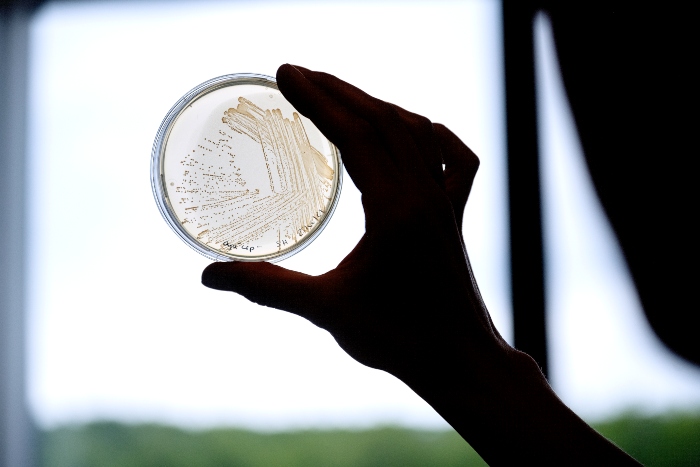Nanograms and microlitres. Sophia Heyde works in very small scales. But her perspective is long: she hopes that her biotech research can contribute to a sustainable future where we won’t be dependent on fossil energy.
She works with so-called cell factories, where microorganisms such as bacterial or yeast cells produce a beneficial substance. This can be a specific chemical, a medical substance such as insulin, a biofuel, or something else that would otherwise require oil to produce.
There are now very effective tools to make genetic changes in cells that can cause them to produce the desired substance. But the changes can also cause problems. For example, they can overheat the environment in which the cells grow. Or the proteins that the cell is genetically engineered to produce may prove toxic to it.
These are the kinds of problems Sophia is trying to tackle—using evolution as a tool.
“Bacteria were here millions of years before us. Some have evolved to live in hot springs, others in cold seas. A few years ago, a bacterium was discovered that has become able to live on plastic, and if we find a way to use it, we might be able to solve one of the biggest problems that our way of life has created. So I’m investigating how the cell itself adapts to various stressful circumstances by changing its DNA. What changes happened and how can we use them when working with the cell factories? These are the kinds of questions I investigate in my work,” she says.

Engineering for the future
Sophia has always been fascinated by trying to understand how life works. She started studying biology at the Technical University Darmstadt in Germany, where she grew up. When she attended a conference on cell factories (metabolic engineering), she discovered which direction she wanted to pursue.
“This is the future, and I want to be part of it,” she thought.
She went on to pursue her interest in various universities in Australia and the US. At the Joint BioEnergy Institute in California, she met some researchers from Denmark, who made her aware that Denmark is a European biotech centre. And when she saw there was a vacant PhD position at the Novo Nordisk Foundation Center for Biosustainability at DTU, it was an obvious chance for her to move closer to her German family again.
The fact that DTU also offered fantastic working conditions made it even more attractive.
“The new building, 220, is one of the best equipped and most beautifully designed buildings I’ve been in. DTU also has a great working culture. There’s a good connection between people, and you can always find someone to discuss big and small issues with. It’s a positive and friendly place to be, and at the same time there are good opportunities to get guidance and funding for commercialising promising research projects,” says Sophia.
She completed her PhD in mid-June, but fortunately she’s not leaving DTU jut yet. She’s been hired as a postdoc to continue working on an idea she developed during her studies with her supervisor, Associate Professor Morten Nørholm:
“The ideal production scenario in the cell factory is that the cells grow and produce the desired substance. But often researchers and companies instead find that the new substance has a toxic effect on the cells, which actually die or grow slowly and stop producing. So I’ve developed a small piece of DNA that’s inserted into the cell and removes the toxic effects, so the growth is restarted and the cell produces as much as possible,” says Sophia.
She’s now developed the idea to the point were she can start looking at ways to commercialize it. And she hopes to have set up a start-up by the end of the year.
“It’s super exciting, not just to research, but also to develop something that others can use. In this way, I can contribute something to the sustainable future we want.”